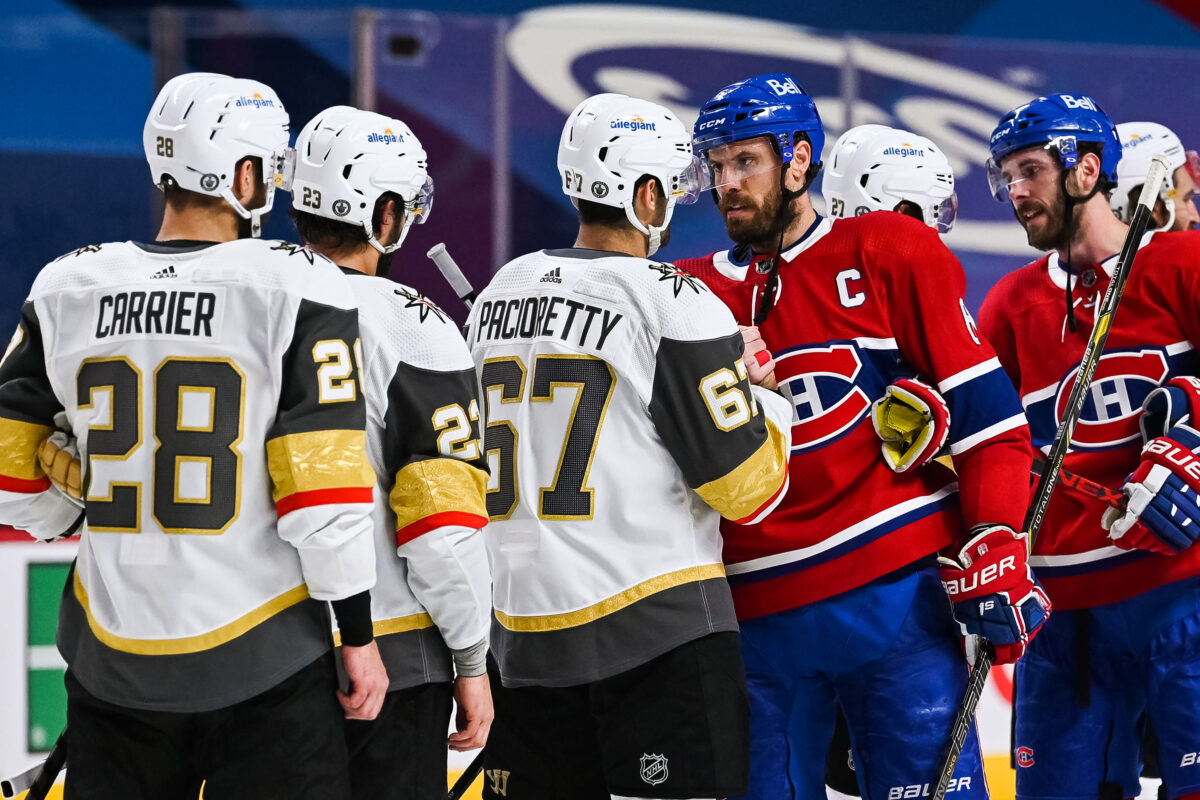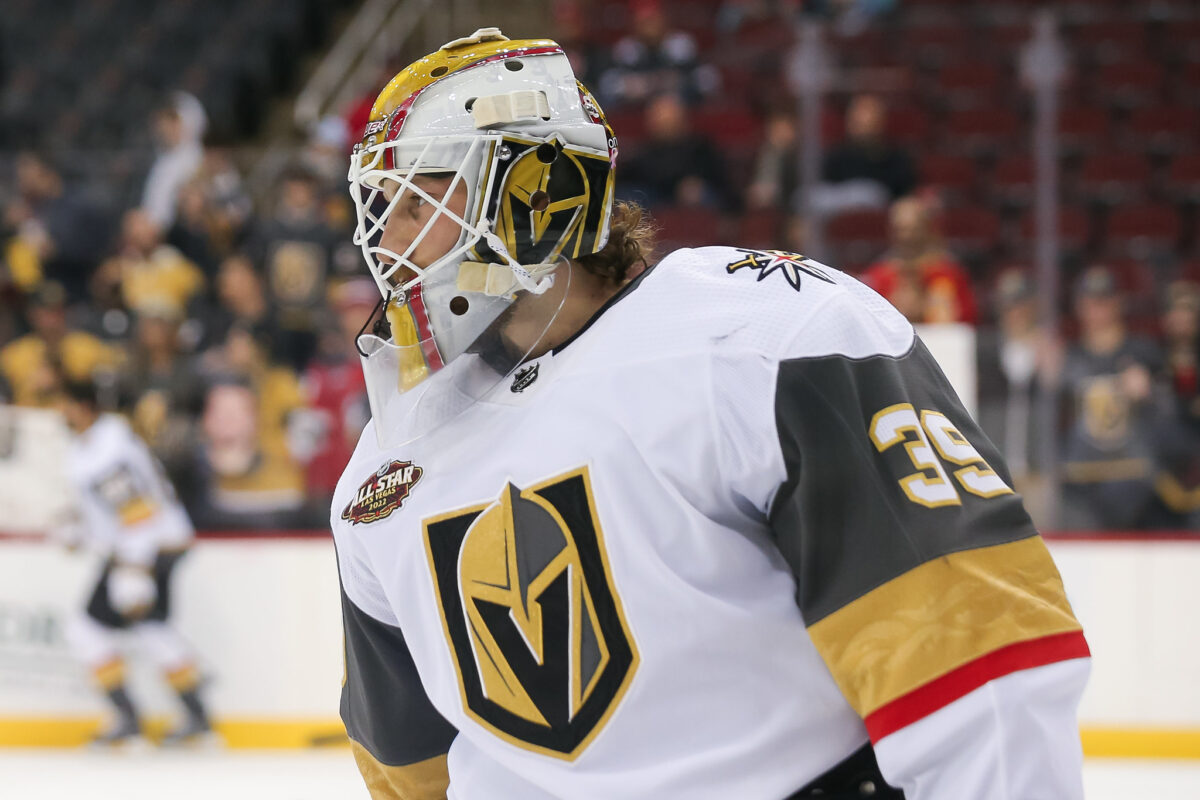For as interesting as cap considerations can sometimes be as they pertain to roster building, they sure can take the fun out of trades. I mean, the Vegas Golden Knights just landed one of the best defensive players of the past decade, and the heart and soul of the Montreal Canadiens team that ousted them in the 2021 Conference Final. As we all know, however, it was actually the injured Shea Weber’s contract that Vegas took on in order to finally offload Evgenii Dadonov.
Adding a healthy Weber to an already loaded (and expensive) blue line would’ve probably excessive, irresponsible and cost a whole lot more than Dadonov, but hey, we can dream, can’t we?

With that out of the way, last week’s deal may not make the Golden Knights any better on the ice, at least not immediately or directly, but it certainly helped the club in other ways. The $7.8 million cap hit attached to Weber for each of the next four years will stay buried in long-term injury relief (LTIR), as the 36-year-old is believed to have played his last game. And the club only has to pay out $6 million in real money over the life of the contract.
For assuming Weber’s deal, Vegas was able to trade Dadonov and his $5 million cap hit after failing to do so in a rejected trade deadline move this past season. That leaves the club roughly $5 million under what is now an $82.5 million salary cap. Though hardly awash in space, this does represent (for a brief moment, anyway) a considerable improvement over the cap crunch they’ve encountered in recent years. Here are just some of the possibilities the trade begins to open up:
In-House Free Agents
GM Kelly McCrimmon and the rest of the front office have developed a reputation for consistently seeking roster help from the outside, but there are some in-house names in need of new contracts that are worth considering first. As it stands, Vegas has 16 players under contract for next season (18 if you count injured reserve members Laurent Brossoit and Nolan Patrick, although then the available cap space dwindles to $1.5 million). That leaves seven players from last year’s group unsigned.
The biggest domino on that front — two-way forward and original Golden Knight Reilly Smith — might have already fallen. Reports indicate that the team wasted little time in securing Smith after the Dadonov trade and reached a verbal agreement with the 31-year-old, although an official announcement may be withheld for cap maneuvering purposes.
Smith may be back in the fold, but that still leaves decisions to be made on the remaining Golden Knights’ free agents, now with little money left. Mattias Janmark will likely be looking for work elsewhere after an underwhelming campaign, as will little-used Jake Bischoff. Among the restricted group, McCrimmon would surely like to find an affordable cap figure to bring back Nicolas Roy, Keegan Kolesar, Brett Howden and Nicolas Hague, but that would involve shedding further salary elsewhere.
Roy is coming off of a breakthrough campaign that produced 15 goals and 39 points, so he’s expected to be in line for a raise from the $750,000 he made last year. Kolesar might see a slight pay increase, albeit without topping $1 million. Howden probably lacks the upside or current value to bring back at anything beyond minimum salary. On the other hand, Hague, Vegas’ only restricted free agent without arbitration rights, is a threat to seek a more expensive long-term deal and/or a possible offer sheet candidate.
Holes to Fill
Losing Dadonov’s 20 goals creates a void in the lineup — and that much less insurance — in the event of injuries. Much of that depth could be shored up through team-friendly extensions for Vegas’ own free agents, but even that would still leave open a key middle-six forward role. It’s possible Michael Amadio gets a long look there, coming off a career-best 11 goals in 53 games after being claimed on waivers back in October, although that would only inspire more questions about scoring depth.
The blue line remains typically solid, even if the Golden Knights didn’t exhibit the same level of traditionally strong defensive play last season. That said, the influence of incoming head coach Bruce Cassidy, coupled with hope of a return to health and some steps forward from the likes of Hague and Zach Whitecloud, should be enough for now.

Another question mark exists in net, where Robin Lehner’s first season as the unquestioned No. 1 goalie saw him manage mediocre numbers over just 44 games. Laurent Brossoit, brought in as Lehner’s backup via free agency, disappointed as the second option while struggling with injury issues of his own. In fact, the most positive development between the pipes turned out to be the debut of Logan Thompson, as the 25-year-old third stringer sported a 10-5-3-1 record with a .914 save percentage and 2.68 goals-against average.
Possible Solutions
Dadonov was probably the most obvious candidate to move, particularly given the club’s much-publicized earlier attempts. But as we’ve laid out above, more will need to be done to manage a full, cap-compliant lineup. Golden Knights fans have surely grown accustomed to these salary cap gymnastics over the past few years.
The emergence of Thompson last season makes Brossoit and his $2.325 million salary for next season an obvious candidate to move, provided McCrimmon can find a taker. As long as Thompson continues to improve and gain confidence in the crease, his near-minimum salary for the next three seasons could represent a desperately-needed bargain. Moving Lehner’s $5 million cap hit would obviously be more impactful, but then you’d have to find an equally capable replacement No. 1 making less, which is no easy feat.
You Might Also Like
- Canadiens’ Caufield Breaks Lafleur Record for Most Go-Ahead Goals
- 5 Takeaways From Oilers’ 5-4 Loss to Sharks
- 3 Takeaways from Devils’ 3-1 Victory in St. Louis
- Penticton Vees Set New CHL Record for Most Wins by an Expansion Team
- Sabres Should Think About a Ristolainen Reunion at the Deadline
Other possible cap-minded roster moves are complicated by both their effect on the team’s on-ice performance and the fact that they likely wouldn’t fetch a significant return given Vegas’ lack of leverage. Alec Martinez, for example, is a popular target of trade speculation due to his age (34), contract ($5.25 million in each of the next two years) and the club’s deep blue line, but he’s just a year removed from logging over 22 minutes a night during the 2021 postseason.
Other players in a similar situation include Max Pacioretty ($7 million), William Karlsson ($5.9 million) and Brayden McNabb ($2.85 million). Of course, each of the aforementioned names would create a substantial hole in the lineup which would need to be shored up.
Cassidy is in place and Dadonov is on his way out, leaving some cap flexibility in his wake. But don’t sit back and relax just yet, McCrimmon. As you can see, there’s plenty of fine tuning still left to do in order to achieve a deep, dangerous and, most importantly, cap compliant roster by the time opening night rolls around.